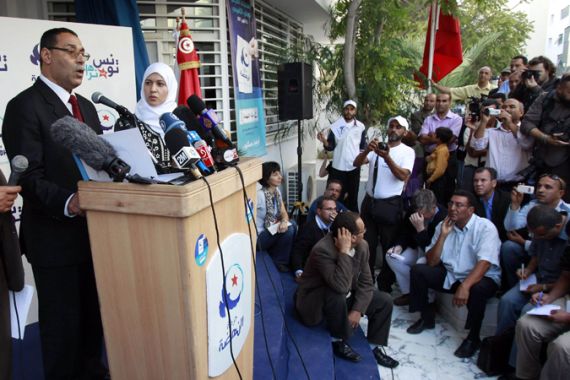Ennahdha claims victory in Tunisia poll
Moderate Islamist party says it has won more than 40 per cent of seats as PDP concedes it will be in opposition.

The moderate Islamist party Ennahdha has claimed that it has won more than 40 per cent of seats in Tunisia’s 217-member consitutent assembly, after the country’s historic election.
“The first confirmed results show that Ennahdha has obtained first place nationally and in most districts,” Abelhamid Jlassi, the party’s campaign manager, said at a news conference citing its own election monitors’ reports.
The party’s claim that it won 90 seats came before of an announcement by ISIE, the country’s independent election commission, of the provisional results for overseas seats.
The leaders of two leftist parties, the Congress Party for the Republic (CPR) and Ettakol, said they were fighting for second place, while the leader of the centre-left Progressive Democratic Party (PDP) conceded defeat on Monday evening.
“Ennahdha is certainly the majority, but there are two other democratic entities, Ettakatol and the CPR, who were weak at the start but now find themselves in the position to contribute to political life and usher a rational modernity in this Arab-Muslim country,” Khalil Zaouia, Ettakatol’s number two, said.
Late on Monday, the Reuters news agency, citing senior Ennahdha official Ali Larayd, reported that Ennahdha was considering forming a coalition with both Ettakol and the CPR.
Overseas seats followed the trends established for domestic districts, with nine of the 18 seats reserved for overseas Tunisians going to Ennahdha, four to Ettakatol, three to the CPR, and one each to the Democratic Modernist Coalition (PDM) and Aridha Chaabia, according to an announcement by the country’s election commission.
Samir Dilou, a member of Ennahdha’s political bureau, said that his party had won “not far from 40 per cent” of the vote.
“The trend is clear. The PDP is badly placed. It is the decision of the Tunisian people. I bow before their choice,” PDP leader Maya Jribi told the AFP news agency at her party’s headquarters in Tunis earlier in the day.
“We will be there to defend a modern, prosperous and moderate Tunisia,” she said, adding the PDP would “clearly be in opposition”.
‘Compromise’
Jlassi, speaking from Ennahdha’s headquarters in the Tunis suburb of Montplaisir, said that his party’s priority was to restore stability to Tunisia.
| IN VIDEO |
|
Al Jazeera’s Nazanine Moshiri reports from Tunis |
“We would like to reassure our trade and economic partners, and all actors and investors, we hope very soon to have stability and the right conditions for investment in Tunisia,” he said.
“The priorities for Tunisia are clear. They are stability, conditions for a dignified life and the building of democratic institutions in Tunisia. We are open to anyone who shares these objectives. We are open to all forces without
exception,” he said.
Some estimates go so far as to give al-Nahda more than 50 per cent of the vote.
Ennahdha has not competed in an election since 1989, when ex-President Zine El Abidine Ben Ali allowed individual candidates from the party to participate before allegedly tampering with the results.
Tunisia’s independent electoral body was created early in the year after Ben Ali was forced from power by a popular uprising.
In the space of a few months, it has written new electoral rules and created electoral lists from scratch, receiving high praise on Monday from a delegation sent by the National Democratic Institute, a US-based organisation that helped monitor Sunday’s vote.
“This election to me was hands down, the best, the most promising I’ve ever seen, including in the United States,” Jane Harman, president of the Woodrow Wilson International Center and former US congresswoman from California, said at a press conference in Tunis.
Delivering conclusive results could prove to be the biggest challenge for the ISIE, faced with pressure to promptly announce the results from many Tunisians, while others demand investigations into allegations of election irregularities.
Outside the media centre run by the electoral authorities, a group of about 30 protesters called on the electoral commission to take action for what they said were alleged violations of the electoral code by Ennahdha and other parties.
Some carried signs saying “30 TND [$21] = one vote”.
Adnan Ben Hamachia, who had been head of an independent list “The Big Project” in the election said those who had lost should concede defeat and the electoral authority should deliver the results promptly.
“All the media around the world are reporting that Ennahdha won between 50 and 55 per cent,” he told Al Jazeera. “Yet the ISIE is refusing to give any results. Something is happening.”
He said that he was willing to accept the provisional results suggesting he had lost, and that others should do the same.
“I don’t support Ennahdha, but I understand that many people, especially in poor areas, voted for them.”
The newly-elected assembly will rewrite the constitution and also choose a new interim government and set dates for parliamentary and presidential elections.
Boubaker Bethabet, the ISIE secretary-general, said 90 per cent of the estimated 4.1 million citizens who registered before the poll cast their votes.
More than 11,000 candidates ran in the election, representing 80 political parties. Several thousand candidates ran as independents.
The electoral system was designed to include as many parties as possible in drafting the new constitution, which is expected to take a year.
— With reporting from Yasmine Ryan